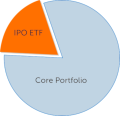Virgin America, a low-cost airline operating primarily out of San Francisco and Los Angeles, announced terms for its IPO on Monday. The Burlingame, CA-based company plans to raise $300 million by offering 13.3 million shares (2% insider) at a price range of $21 to $24. At the midpoint of the proposed range, Virgin America would command a fully diluted market value of $1.0 billion.
About the company
Virgin America faced a highly tortuous and litigious beginning. In 2006, competitors challenged the legality of Virgin Group's ownership, given that its American hedge funds Black Canyon and Cyrus Capital had put options that could reduce their ownership (Americans must have 51% ownership and 76% voting power of domestic airlines). As a result, Virgin America lost its CEO and over $100 million as its fleet sat unused.
In 2010, a spike in fuel costs battered the airline industry, and Virgin's investors exercised their puts, which would force Virgin to buy shares and violate US federal law. Cyrus instead bought Black Canyon's shares, and the hedge fund will own a 35% post-IPO stake in Virgin America. The company's other primary shareholders include Richard Branson's Virgin Group (25%) and PAR Capital Management (7%), which will purchase $52 million worth of shares at 96% of the IPO price in a concurrent private placement. Certain non-officer employees plan to sell 2% of the float and Cyrus will sell shares on the overallotment.
Virgin America now serves 21 airports across the country, though 2013 flights coming in and out of San Francisco and Los Angeles represented 54% and 45% of total passengers, respectively (double counts flights between the two cities). Virgin notes that it recently added service to Dallas Love Field and acquired slots at New York LaGuardia and Ronald Reagan Washington National.
Key metrics
Virgin served about 3% more passengers (4.9 million) in the 9 months ended September 30, 2014, compared to the prior year period, and yield per passenger mile grew 1.2% to 13.1 cents. Revenue per available seat mile (RASM) grew 5% to 12.2 cents and cost per available seat mile (CASM) rose 2% to 11.2 cents. The company claims despite offering amenities to build customer loyalty, its CASM is kept in check by its focus on two main airports and its fleet of only one type of aircraft.
Another company in the airline industry, aircraft lessor Avolon Holdings (AVOL), filed for an IPO in early June that could raise $300 million. Two airline technology companies have gone public this year - Travelport (TVPT; down 10% since September IPO) and Sabre (SABR; up 8% since April IPO)
Recent financials
Revenue increased 5% to $1.1 billion for the nine months ended September 30, 2014, primarily due to an increase in passengers, route maturity and the addition of ancillary products such as credit cards and seat selection charges. Virgin America's EBITDA spiked 44% to $97 million primarily due to lower aircraft rental costs, partially offset by higher landing fees and salary expenses. EBITDAR grew just 5% to $234 million, helped by lower fuel costs. Fuel charges (34% of revenue) and leasing costs (12%) are generally industry-wide, but the company notes a higher competitive market for personnel and rising regulation. It also expects landing fees to increase as a percent of revenue as airport incentives expire. The company will exchange related-party notes for equity and use IPO proceeds to pay down debt, dropping pre-IPO debt of $805 million to $118 million.
Virgin America, which was founded in 2004 and booked $1.5 billion in sales for the 12 months ended June 30, 2014, plans to list on the NASDAQ under the symbol VA. Barclays and Deutsche Bank are the joint bookrunners on the deal. It is expected to price during the week of November 10, 2014.


